#like there is no way for the system to be reformed because the system is based on the idea that there is something inherently wrong with us
Text
my possibly unpopular opinions on therapy/psychiatry
- Just like suffering is not inherent to womanhood, suffering is not inherent to humans. Just like it is not okay to just expect that women will be subjected to suffering, it is not okay to expect that it will happen to anyone and it's just the way things are.
- Therapy is not inherently wrong for trying to alleviate the suffering, but I fail to see the doctors acknowledging the fact that the suffering is a collectively shared experience, and suffering is caused by someone. Moreover it is the whole point of therapy to focus on just yourself, "take responsibility"(for the harm that was done to you?) and seeing what you can make do. Basically because again, doctors cant really tell their patients to go overthrow the gvt or divorce their shitty husbands. Thus endless copium instead of, yknow... something actually meaningful.
- Antidepressants arent inherently bad but they cant cure you. They are just psychoactive drugs. Caffeine, tobacco, cocaine, they all are psychoactive in one way or another, and your brain doesnt really care if the substance is legal, illegal or prescribed. It modifies the symptoms but it cannot actually cure you. Or something. If you struggle with depression/anxiety related issues, I would highly recommend that you try to look for a way to alleviate them that is not just you popping pills for 10 years in a row.
- Our society is purposefully built to fuck us up. Just like "dyslexia" is not a thing in societies that dont have a writing system, "ADHD" or "depression" or "anxiety" are non-syndromes, they show only in very specific circumstances. It is possible to reform the world so that it doesnt force suffering and disabilities onto people.
- Psychoactive drugs that actively alter people's neurochemistry and may lead to both psychological and physical dependency are catastrophically overprescribed and one day the big pharma will be held accountable for their crimes lol
- I repeat that I do not oppose psychiatric medicines as a concept. Psychiatric disorders fuck people up, I know it personally. BUT. Sorry but there is a difference between a socially-induced disorder like anxiety, and a disorder of a purely biological genesis like bipolar mania or schizophrenia. I dont think depression or anxiety are easy. But consider what, someone suffering from delusions in mania cannot CBT their delusions away, they basically have to be on meds. MAYBE think really hard of the pros and cons here. You are lucky to have a relatively healthy brain, dont wash it down the drain.
- Medicalization and profiting off of any suffering is highly concerning. The transgender pharma will also pay for their crime of persuading (otherwise healthy) people that they cannot exist and will literally kill themselves without unnecessary medications and surgeries.
- If you have agreed on me on the previous points but my opinion on transness triggered you, consider unbrainwashing yourself? Idk? Can't you put 2 and 2 together? These are literally the same kind of phenomena.
- I say it all as someone who has been on antidepressants for a long time, and also who knows many people who were on antidepressants for a long time. I've seen both huge benefits and huge debilitating side effects.
As a matter of fact I am also completely normal and can be trusted w
16 notes
·
View notes
Text
.
#saw that bible books tournament blog#had to remind myself that probably most protestants using the word apocrypha don't know what it means#because it's always kinda shocking to me#“I'm not of a denomination that reads THE FALSE ADULTERATED BOOKS”#darling a little more respect#they may not be canon to you#but they were widely read and respected in Christianity for over 15 centuries#as *later* canon of course which is a different place than early canon#they are not at the same level as like... the gnostic gospels#but it also encapsulates that attitude of#oh there's this gap of centuries between the very early Christians and the reformation#where I guess everyone was doing christianity stupidly and wrong in all ways#okay i got it out of my system moving on#Christianity#Catholicism#tagging for the people that blacklist those#not to make this a debate
20 notes
·
View notes
Text
just saw someone call horrorstör by grady hendrix “cozy horror” i’m sorry but in what world. you have to be so removed from the reality of what working retail is like to be like hehe cozy horror because it takes place in haunted ikea :) also like. was it so super cozy when that girl gets possessed and starts choking on her own snot lol like some of the shit he describes in this book is so vile so please explain to me what part of the book is cozy
#it’s about like. inhumane treatment of prisoners in the past and the imposition of the protestant work ethic on people working#for inadequate compensation and the way that exploitation of labor persists in our modern work lives despite attempts at reform#because the system is so ingrained in a history of abuse fueled by the moral weight of the protestant work ethic#and our culture is so attached to the self made man ‘pull yourself up by your bootstraps’ narrative#and ladder climbing mentality and ideas about what types of job ‘deserve’ minimum wage vs a livable wage#and we’re so used to pouring all of our time and energy into our jobs that we become part of the corporate machine without having time and#energy left to thrive in our own personal lives#but sure it’s ‘cozy’ because ikea smh#idk it just annoys me because people will just be out here saying shit that doesn’t mean anything because it’s a buzzword
14 notes
·
View notes
Note
I work security at the emergency room of a hospital. It would be nice to not have people come through with burns from "volatile cheese" or get stabbed because ACAB people think a white security uniform and blue police uniform are the same. I would like a summer without peaceful protests that result in the ER overflowing... Calling for honorable violence is great until ambulances aren't even able to the dock because it is to crowded.
I say this with love: Citation needed.
Because at the end of the day, tragic as that is, it only reinforces what I have said: kill the tyrants. Spill blood from the top.
Not the bottom, not to your left or right: upward. From the top.
#oh but what about these people?#i know the bar is low but im super done with the state of everything#no#stop#shut up#dont bother me with whataboutism#either do something to help people or stay put of the way#because if you sit on your hands#even more people are going to get hurt like it or not#im tired of people pretending we have to accept how things are#im tired of pretending you can vote things better#im sick of the idea that the systems that benefit the worst of mankind can be reformed#burn it all down#if people are so ignorant and so uneducated as to direct their anger at unrelated people#congratulations! youve identified a symptom of the conditions we live under: a divide and conquer existence set up to benefit the top#you know how to solve that? behead those at the top#help one another but never forget who the real enemy is: the rulers and tyrants
57 notes
·
View notes
Note
Okay, hear me out on this one:
Elita-1, prior to becoming Blackarachnia, was spunky, confident, and energetic.
Wasp, prior to becoming Waspinator, was a rude, arrogant bully.
So, perhaps to serve as a contrast to both of them (and be something more unique than just present day Icy given the idea of Icy being an alter created to act as the host rather than the original personality), Pre-TC!Blitzwing was timid, sensitive, and anxious to the point of being selectively mute, which is one of the many reasons why he never fronts during the show’s run.
Though given how chaotic the current BETC!Blitzwing-Blackarachnia-Waspinator dynamic is, one can only imagine how hectic the dynamic between their past selves would be.
Pre-TC Blitzwing would've probably had a lot be timid, sensitive and anxious about because of the triple changer subjects he was the only one that could fully classify and identify with being a warframe, unlike the commercial airliner/cargo plane Octane being shoved into the distorted title of warframe and Astrotrain being very much the most civframe out of them all; he may be more considered to be cargo/transport frame outside of the broad war vs civ generalisation. You'd have to be blind or blatantly ignorant to kinda skip over the fact that warframes have been a victim to prejudice and discrimination and that original frame Blitzwing very much has to deal with a lot of that bias and - both a combination of 'just being like that' and 'hyper aware of stereotypes' - comes across as someone more 'palatable' than the especially prevalent early Decepticon movement. Being selected specifically for Autobot research certainly doesn't fucking help at all- no no not one bit-
I've been thinking recently what Autobots actually consider as warframes since propaganda on Cybertron seems to state that there are no flying Autobots; the Jettwins a marvel and a bizarre sight to see on modern post-war Cybertron. Makes me think that the designation of 'warframe' is actually more broadly all flying frames (civillian and military) with the additional category for tank and weapon frames, ground warframes like APC units and heavy trucks being 'exceptions' considering that Bulkhead - our resident 'got into the academy once' Autobot - has an armoured truck alt on Earth; seeing how he was relegated to 'farm bot' on one of Cybertron's moons and further shoved out into a space bridge repair crew (even with his avid enjoyment for it), one could say that there is still energon in the water. Any 'Bot flier got banished, reformated or destroyed depending on level of resistance and interest in remaining on Cybertron.
With two civframes being being either spunky and arrogant (however much they each buy into Autobot propaganda), Pre-TC Blitzwing or the alter of him fronting would NOT enjoy himself one moment. The only benefit BETC!Blitz gets is that tapping out is a quick twist of the face and boom, someone to better confront the situation with.
#ask#anonymous#blitzwing#tfa blitzwing#transformers#tfa#tfa au#BETCs#bot experiment triple changers#maccadam#pre-tc blitz would've preferred not to be seen- especially not by the 'bots but also not by the 'cons#like sure he liked the idea of a systematic reform but not through their method (or the only way they could be heard)#even though his very existence was political- he was really desperate to avoid it#getting selected by designation in an autobot trial of [classified] terrified the scrap out of him#but in an effort to be 'one of the good ones' by not taking a step back and looking at the situation#blitzwing went ahead and took that leap of faith that caused his world to crash and burn#the system didn't know if he had specifically been chosen BECAUSE of his timid pushable personality#octane would've been picked because he was a 'warframe' and dealt with the prejudice just for being a flier#thus he was a very avid advocate for warframe rights despite himself not technically falling under the term#astrotrain was picked because he was very isolated due to his function- transporting cargo across large expanses#very much distant from politics especially because of cross city state interactions#(sidenote would it be interesting just to diversify the human translated genders between these tfa tcs?)#whatever the reasons the 'bots took someone uncomfortable with being who they were because the world told him to be#and turned them into twice the weapon he was and split into pieces that would become the blitzwing system#where he would revolt rage and rise through the ranks of the decepticons to be within megatron's own central command#the original versions of elita-1 wasp and blitzwing would NOT get along#so long as wasp doesn't become waspinator blackarachnia and BETC!blitz may get along swell to 'i can smell the hypocrisy'#and waspinator and blitz would both tick off 'cannot trust own faction anymore' off their trauma bingo cards
7 notes
·
View notes
Text
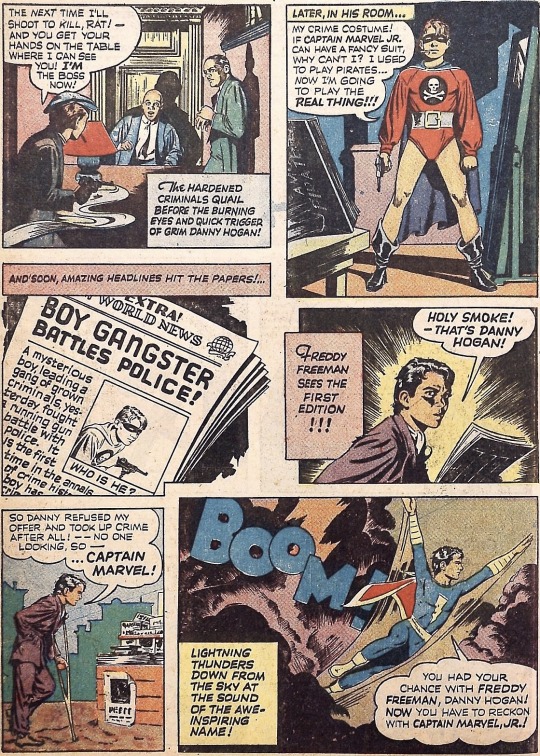


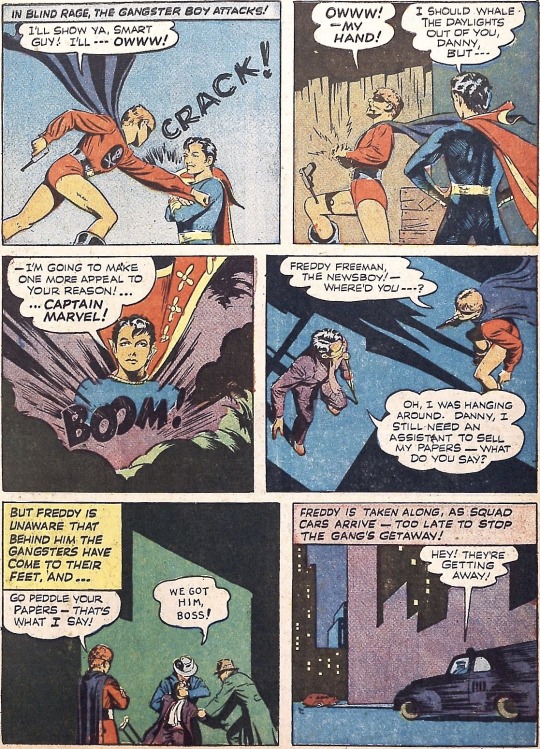
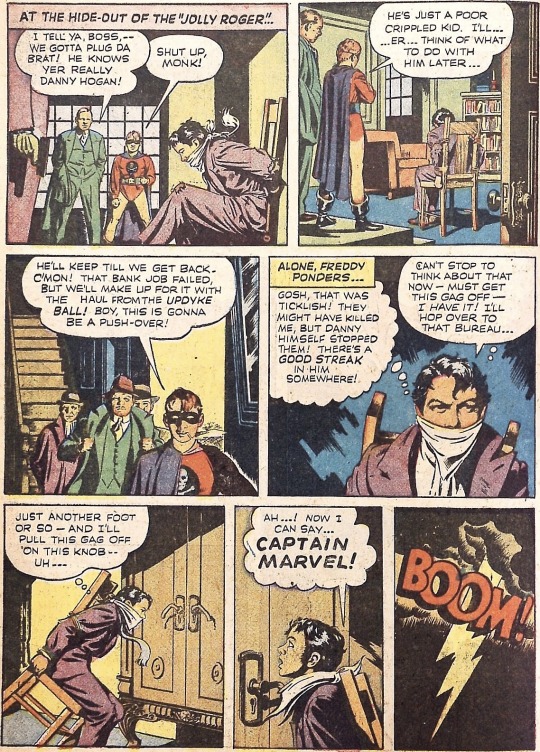
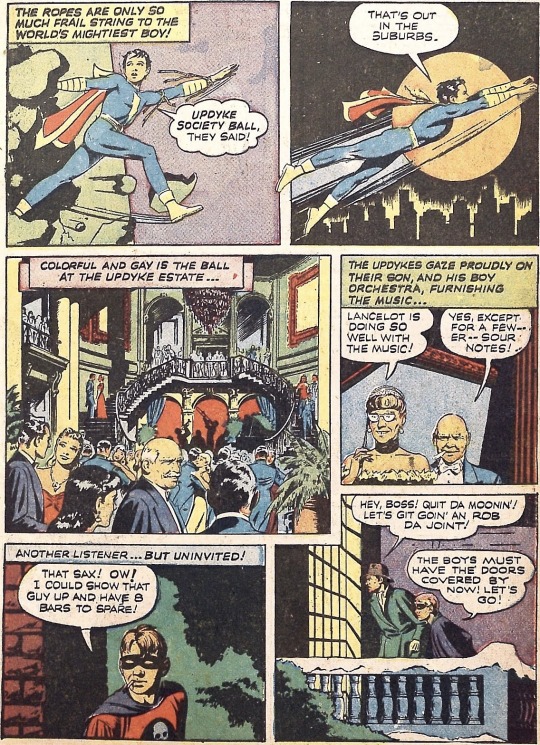


Master Comics (1940) #35
#again to me this is like radical in comparison to the Captain Marvel stories#I just read once last week that was about a criminal kid#and the concluding message was that even if you have personally reformed and seen the error of your ways and won’t commit a crime again#we can’t just let you go#you still have to go through the proper channels and face your punishment like a true American#but because our American systems are just the punishment you receive will be fair and you won’t regret turning yourself in#whereas here Junior makes sure that the criminal kid who he thinks has good in him doesn’t get caught by the police#fawcett comics#freddy freeman#my posts#comic panels
6 notes
·
View notes
Note
Hiya! I was wondering if you knew of any literature about reforming the psych system because I agree its broken AF and as someone who's a part of it I want to be able to do better. No worries if not, I just saw posts you've reblogged and thought you'd be a good person to ask!
i do have some recommendations!
"mind fixers: psychology's troubled search for the biology of mental illness" by anne harrington and "comfortably numb: how psychiatry is medicating a nation" by charles barber both give a history of the medicalization of mental illness and critique the biomedical model. (hint: there's a lot of BAD science that makes up the core of psychiatry - the evidence for there being a biological basis for mental illness and psych meds working at all is very flimsy.)
the disorderland podcast debunks bad science, especially pop science, talks about the commodification of mental health, and explores whether the symptoms we pathologize are actually symptoms.
"madness and oppression" by fireweed collective is a workbook that helps you see how you're not crazy -- you're oppressed. it looks at how what a psychologist/psychiatrist would consider a symptom is actually a very rational and normal response to being oppressed.
"on your own: patient-controlled alternatives to the mental health system" by judi chamberlain is written by a psych survivor, and goes into her own experiences as well as what alternatives exist to the system. great for learning about peer support!
"stolen" by elizabeth gilpin is a memoir by a psych survivor. she was abducted and taken to a "treatment" program in Appalachia, then went to a boarding school that functioned more like a prison with abusive group therapy. this one's good for humanizing mental illness BUT can be triggering as hell to psych survivors - so proceed with caution.
"the zyprexa papers" by jim gottstein is probably my favorite on the list, it's about how the antipsychotic zyprexa causes diabetes and metabolic disorders, and is still commonly prescribed (this is how i got diabetes). it shows how psych med regulations are not enforced, especially since zyprexa is often prescribed off-label for conditions it hasn't been shown to be clinically effective for, and has led to death in some cases.
madinamerica.com is a good site to explore for psych abolition, debunking psychology research, new psychology research that centers patient's autonomy and rights, and personal accounts of mental illness. it's been around for a decade so there's a lot of quality content to sift through!
i also recommend reading about peer support and peer respite houses - i don't have any particular books or articles about them, but that can be a good jumping off point to looking for an alternative model to the current psych system.
#i say this all with the caveat that i am a psych abolitionist NOT a reformist#i encourage you especially to read the first two#it's really important to understand that the evidence we have for mental disorders/diagnoses are vastly unsupported by the science#that aims to prove them#if you are not a psych survivor i encourage you to read pieces by psych survivors#it's important to humanize the people you're working with/learning about and it also helps paint a picture of the abuse we experience#i HOPE that after engaging with the system you start to see that it's not broken it's working as intended#psychiatry is a form of social control#it is dehumanizing#it inherently takes away your autonomy because diagnoses call your capacity to decide things for yourself into question#we are often belittled#told we're crazy#minimized#talked over#told we couldn't possibly make responsible decisions for ourselves#ETC#AND psych wards function as a prison#like there is no way for the system to be reformed because the system is based on the idea that there is something inherently wrong with us#and there isn't#the symptoms we experience are actually NORMAL parts of the human condition#psych abolition#antipsychiatry#actually delusional#actually disabled#actually psychotic#mad
9 notes
·
View notes
Text
Never going to get over the fact that Guel was practically slapped in the face by the consequences of Jeturk and the Benerit Group’s actions, and the conclusion he drew from that was not “Jeturk and everything it stands for is monstrous, it should be dissolved” but “Jeturk is my dad’s company so I should be in charge.”
#alex.txt#I actually *like* that the corporations got off rather light#because a bunch of plucky kids could not reform that broken hellscape of a system#that would be a betrayal of Gundam in my opinion#but the way Guel’s arc ended just. hm.#not sure how I feel about it.
2 notes
·
View notes
Text
I read the comic in one sitting less than an hour after finishing the movie, and wow I have many Thoughts™.
- It's very obvious the two versions were meant to cater to different audiences AND tell different messages. I don't get why people are going "But the comic was better! It had more nuance!" just because Nimona was easier to root for in the movie.
- The comic was written back when ND Stevenson was still trying to process a lot of stuff, so all the characters are morally grey/straight up evil and the climactic battle is between a Ballister who regrets turning against Nimona, even if it was to save others vs. a Nimona who's too hurt to care if her lashing out was going to hurt innocent people.
- By the time Nimona got a movie adaptation, ND was a lot more secure in his sexuality, so the climactic battle was Nimona vs. the Director, the symbol of religious oppression and bigotry. It's not just about your friends turning on you because you're "too much" for them anymore, it's also about a society that would rather bring itself to the brink of ruin than coexist with you.
- (I totally get why people were upset about Ballister's surname change, though. Like come on, the media dubbing him Blackheart just to be mean was RIGHT THERE).
- Nimona's metaphor for not shifting is such a neurodivergent thing. Even in the comic, Nimona's parents insisting she's a monster who replaced their daughter is reminiscent of the changeling myth, which is what many parents thought their neurodivergent kids were—changelings who replaced their "real" children.
- Ambrosius being trained to cut off HIS BOYFRIEND'S WHOLE FUCKING ARM instead of merely disarming him is a very cop thing to do. As much as cops claim they're trained to de-escalate situations, their training still teaches them to treat everyone as a potential threat, and that level of constant vigilance can turn anyone into a trigger-happy/arm-choppy bastard. Even the Director, who can use a sword but probably hasn't actually fought someone in ages, STILL can't see Ballister reaching for the squire's phone without assuming he has a weapon.
- And on that note, the Queen getting killed simply because she was trying to reform the Institution and allow commoners to become knights? That's the best "no such thing as a good cop" metaphor I've seen. Because even if there ARE good cops and they ARE in leadership positions, the system will crush them before they make any meaningful change. It's not a good institution that turned rotten, it's an institution that only exists to spread its rot and refuses to be good.
- That's why Ballister's characterisation is so different in the movie vs. the comic. Comic Ballister had 15 years to come to terms with his trauma and the Institution's evildoing, while Movie Ballister is still freshly traumatised and hasn't found a way to define himself beyond the role he was assigned by the Institution.
- Not to mention Comic Ambrosius was not very noble to begin with and genuinely believed Ballister was better suited to villainy than heroism, while Movie Ambrosius never wanted the glory that came with his lineage in the first place and only antagonised Ballister because of indoctrination he needed to unlearn (which he did, all by himself, after witnessing the lengths the Director will go to just to kill Nimona).
- It really shows how important it is to surround yourself with loved ones who are open to change. Comic Ambrosius can love Ballister all he wants, but he'll still blast his arm off because he thinks Ballister deserved it anyway. Movie Ambrosius will stop to question what "the right thing" even means, even if he didn't love Ballister enough to defend him unconditionally.
I have so many more thoughts bubbling beneath the surface, but I'll probably address them some other day. In conclusion:

[ID: A pink-haired Nimona grinning evilly while holding up a knife.]
Watch Nimona. This is not a request.
Edit: Added more thoughts!
14K notes
·
View notes
Text
I have to talk about Chester Arthur. His story makes me go crazy. A mediocre president from the 1880s who's completely forgotten today has one of the best redemption stories I've ever heard and I need to make people understand just how cool his story is.
So, like, he starts out as this idealist, okay? He's the son of an abolitionist minister and becomes famous as a New York lawyer who defends the North's version of Rosa Parks whose story desegregates New York City's trolley system.
Then he starts getting pulled into politics and becomes one of the grimiest pieces of the political machine. He wants money, power, prestige, and he gets it. He becomes the right-hand man of Roscoe Conkling, the most feared political boss in the nation, a guy who will throw his weight around and do the most ruthless things imaginable to keep his friends in power and destroy his enemies.
Because Arthur's this guy's top lackey, he gets to be Controller of the Port of New York--the best-paying political appointment in the country, because that port brings in, like, 70% of the federal government's funds in tariffs. He gets a huge salary plus a percentage of all the fines they levy on lawbreakers, and because he's not afraid to make up infractions to fine people over, he is absolutely raking in the dough. Making the rough equivalent of $1.3 million a year--absolutely insane amounts of money for a government position. He's spending ridiculous sums on clothes, buying huge amounts of alcohol and cigars to share with people as part of his job recruiting supporters to the party, going out nearly every night to wine and dine people as part of his work in the political machine. He's living the high life. Even when President Hayes pulls him from his position on suspicions of fraud, he's still living a great life of wealth, power, and prestige.
Then in 1880, his beloved wife dies. While he's out of town working for a political campaign. And he can't get back in time to say goodbye before she dies. Because he's a guy who has big emotions, it absolutely tears him up inside, especially because Nell resented how much his political work kept him away from home. He has huge regrets, but he just moves in with Roscoe Conkling and keeps working for the political machine.
And then he gets a chance to be vice president. The Republican Party has nominated James Garfield, a dark horse candidate who wants to reform the spoils system that has given Conking his power and gave Arthur his position as Port Controller. Conkling is pissed, and he controls New York, and since the party's not going to win the election without New York, they think that appointing Conkling's top lackey as vice-president will pacify him.
They're wrong--Conkling orders Arthur to refuse--but Arthur thinks this sounds like a great opportunity. The only political position he's ever held is Port Controller--a job he wasn't elected to and that he was pulled from in disgrace. Vice President is way more than he could ever have hoped for. It's a position with a lot of political pull and zero actual responsibilities. He'll get to spend four years living in up in Washington high society. It's the perfect job! Of course he accepts, and Conkling comes around when he figures out that he can use this to his advantage.
When Garfield becomes president, Arthur does everything he can to undermine him. He uses every dirty political trick he can think of to block everything that Garfield wants to do. He refuses to let the Senate elect a president pro tempore so he can stay there and influence every bill that comes through. He all but openly boasts of buying votes in the election. He's so much Conkling's lackey that he may as well be the henchman of a cartoon supervillain. On Conkling's orders, he drags one of Garfield's Cabinet members out of bed in the middle of the night--while the guy is ill--to drag him to Conkling's house so he can be forced to resign. He's just absolutely a thorn in the president's side, a henchman doing everything he can to maintain the corrupt spoils system.
Then in July 1881, when Arthur's in New York helping Conkling's campaign, the president gets shot. By a guy who shouts, "Now Arthur will be president!" just after he fires the gun. Arthur has just spent the past four months fighting the president tooth and nail. Everyone thinks he's behind the assassination. There are lynch mobs looking to take out him and Conkling. The papers are tearing him apart.
Arthur is absolutely distraught. He rushes to Washington to speak with the president and assure him of his innocence, but the doctors won't let him in the room. He gets choked up when talking to the First Lady. Reporters find him weeping in his house in Washington. Once again, death has torn his world apart and he's not getting a chance to make amends.
Arthur goes to New York while the president is getting medical treatment, and he refuses to come to Washington and take charge because he doesn't dare to give the impression that he's looking to take over. No one wants Arthur to be president and he doesn't want to be president, and the possibility that this corrupt political lackey is about to ascend to the highest office in the land is absolutely terrifying to everyone.
Then in August, when it's becoming clear that the president is unlikely to recover, he gets a letter. From a 31-year-old invalid from New York named Julia Sand. A woman from a very politically-minded family who has been following Arthur's career for years. And she writes him this astounding letter that takes him to task for his corrupt, conniving ways, and the obsession with worldly power and prestige that has brought him wealth and fame at the cost of his own soul--and she tells him that he can do better. In the midst of a nationwide press that's tearing him apart, this one woman writes to tell him that she believes he has the capacity to be a good president and a good man if he changes his ways.
And then he does. After Garfield dies, people come to Arthur's house and find servants who tell them that Arthur is in his room weeping like a child (I told you he had big emotions), but he takes the oath of office and ascends to the presidency. And he becomes a completely different man. His first speech as president mentions that one of his top priorities is reforming the spoils system so that people will be appointed based on merit rather than getting appointed as political favors with each change in the administration. Even though this system made him president. When Conkling comes to Arthur's office telling him to appoint his people to important government positions, Arthur calls his demands outrageous, throws him out, and keeps Garfield's appointees in the positions. "He's not Chet Arthur anymore," one of his former political friends laments. "He's the president."
He loses all his former political friends. He's never trusted by the other side. Yet he sticks to his guns and continues to support spoils system reform. He prosecutes a postal service corruption case that everyone thought he would drop. He's the one who signs into law the first civil service reform bill, even though presidents have been trying to do this for more than ten years, and he's the person who's gained all his power through the spoils system. He immediately takes action to enforce this bill when he could have just dropped it. He becomes a champion of this issue even though it's the last thing anyone would have expected of him.
He oversees naval reform. He oversees a renovation of the White House. He still prefers the social duties of the presidency, but he's respectable in a way that no one expected. Possibly because Julia Sand keeps sending him letters of encouragement and advice over the next two years. But also because he's dying.
Not long after ascending to the presidency, he learns he's suffering from a terminal kidney disease. And he tells no one. He keeps going about his daily life, fulfilling his duties as president, and keeps his health problems hidden. Once again, death is upending his life, and this time it's his own death. He's lived a life he's ashamed of, and he doesn't have much time left to change. He enters the presidency as an example of the absolute worst of the political system, and leaves it as a respectable man.
He makes a token effort to seek re-election, but because of his health problems, he doesn't mind at all when someone else gets the nomination. He dies a couple of years after leaving office. The day before his death, he orders most of his papers burned, because he's ashamed of his old life--but among the things that are saved are the letters from Julia Sand, the woman who encouraged him to change his ways.
This is an astounding story full of so many twists and turns and dramatic moments. A man who falls from idealism into the worst kind of corruption and then claws his way back up to decency because of a series of devastating personal losses and unexpected opportunities to do more than he could have ever hoped to do. I just go crazy thinking about it and I need you all to understand just how amazing this story is.
#history is awesome#presidential talk#i thought about his story again this morning#and was once again struck by the desire to chase people down and make them understand just how amazing this story is#and instead of harassing random strangers i decided to inflict it on tumblr again#my original essay was rather too long and dry and tangled up in too many other details#and didn't quite capture the 'i want to chase you down and look you in the eye and make you freak out about this with me' vibe of this stor#this still doesn't quite capture it but at least it's shorter#and prevents me from rambling to unsuspecting family members#sorry for inflicting this on you again but what else am i supposed to do?
4K notes
·
View notes
Text
“Crowley is still an angel deep down” “Crowley is more of an angel than any of the archangels” “Crowley was only cast out because he needed to play his part in Armageddon, he's not a real demon” “Aziraphale wants to rebuild Heaven to be more like Crowley because he’s what an angel should be” no. Stop it. This is exactly where Aziraphale went wrong.
Crowley is 100% a demon. He's not actually a bit of an angel, and he's not cosmically better than any of the other demons we see in the series. He's much less vicious than most of them, yeah, but he's also much less vicious than most of the angels, because how “nice” a celestial being is has nothing to do with which side they're technically on. Crowley's kindness comes from him doing his best to help people despite the hurt he's suffered himself, not any sort of inherent residual or earned holiness. He was cast out just like the rest of the demons, and that's an important part of his history that shouldn't be minimized, excused, or, critically, 'corrected.'
Being angelic is not a positive or negative trait in the Good Omens universe. It's a species descriptor. Saying that Crowley is still an angel deep down because he helps people is an in-character thing for Aziraphale to think, certainly--Job and the final fifteen showed that in the worst possible way--but it's not something Crowley would ever react well to, and it's the main source of conflict in the entire "appoint you to be an angel" fiasco.
We know that Aziraphale thinks Crowley's fall was an injustice, but why? Well, because Crowley is actually Good, which means his fall was a mistake, or a test, or a regrettable error in judgment, or…something. Ineffable. Etc. The point is, he’s special, much better than those other demons, and if they can fix him and make him an angel again, everything will be fine! (So once Job's trials are over, everything will be restored to him? Praise be!) Aziraphale has to believe that Crowley's better traits come from traces of the angel he used to know and not the demon he's known for 6,000 years, because that’s how he can rationalize his incorrect view of Heaven as The Source Of Truth And Light And Good with his complicated feelings about Crowley's fall.
But Crowley's fall was not an injustice because he's actually a Good Person who didn't deserve it. Crowley's fall was an injustice because the entire system of dividing people into Good (obedient) and Bad (rebellious) is bullshit. Crowley is not an unfortunate exception to God's benevolence, he is a particularly sympathetic example of God's cruelty.
And really, Crowley doesn't behave at all like an angel, especially when he's at his best. All of the things that he's done that we as the audience consider Good are things that Heaven has directly opposed. (See: saving the goats and children in defiance of God in S2E2, convincing Aziraphale to give money to Elspeth despite Heaven's views on the "virtues of poverty" in S2E3, speaking out against the flood and the crucifixion in S1E3, tempting Aziraphale to enjoy earthly pleasures because he thinks they'll make him happy, stopping Armageddon.)
Heaven as an institution has never been about helping humanity. And that's not an issue of leadership, as Aziraphale seems to think--it's by design. Aziraphale's first official act as an angel toward humanity was to literally throw them to the lions. Giving them the sword wasn't him acting like an angel, it was just him being himself. Heaven doesn't care about humans. It's not supposed to. It's supposed to win the war against Hell, with humans as chess pieces at best and collateral damage at worst.
Yes, it's easier to think that there are forces that are supposed to be fundamentally good. It's easier to think that Aziraphale is going to show those mean archangels and the Metatron what’s coming to them and reform Heaven into what it "should" be, and that God is actually super chill and watching all of this while shipping ineffable husbands and cheering for them the whole way. And of course it's easier to take Crowley, who Aziraphale (and the audience) adores, and say that he deserves to be on the Good team much more than all those angels and demons that we don’t like. But that's not how it works. People are more complicated than that, even celestial beings.
Crowley is a demon, and the tragedy of his character is not that he's secretly a good guy who is being forced to be evil; the tragedy is that he's lived his whole life stuck between two institutional forces that are both equally hostile to the love he feels for the universe and the beings in it. There are no good and bad guys. There are no "right people." Every angel, demon, and human is capable of hurting or helping others based on their choices. That is, in fact, the entire fucking point.
#good omens meta#good omens#good omens season 2#crowley#long post#i feel like this is obvious. and yet#when crowley is kind he is NOT acting angelic. the same is true of aziraphale.#(to a point. i do think aziraphale performs 'niceness' sometimes because he feels like it's something he Should do as an angel)#(but that's because aziraphale has so many issues i cannot detail them in the tags of this crowley post)#this is my second long meta post in like 3 days. sorry. it’s my first free weekend in a while
2K notes
·
View notes
Text
I think Crowley falls into two of the classic pitfalls of people who see that the problems are systemic long before anyone else around them does: impatience and despair.
(Yes yes I know, “Crowley was an optimist.” Book Crowley is an optimist. I don’t think that line is particularly useful for analyzing TV Crowley. Stay with me here.)
Let it be said that 95% of the time, Crowley has the patience of a fucking saint (ssh don’t tell him) around Aziraphale. He knows that Aziraphale needs to build his little plausible deniability rationales in order to do something that they both know he wants to do (because it’s right or simply because he would enjoy it) but Heaven wouldn’t approve of. And most of the time, Crowley is happy to help Aziraphale get there, asking the questions Aziraphale is afraid to ask, offering excuses and justifications until Aziraphale finds one he can accept. He does a lot of work of parsing out when “no” means “you haven’t convinced me yet, keep trying” and pushing through all the “I’m an angel, you’re a demon, we’re on opposite sides and mine is the good one” talk that Aziraphale gets up to all the way through s1. Because he knows that Aziraphale doesn’t really believe that stuff, right? He just needs some time to talk himself around his own cognitive dissonance, and most of the time Crowley is not only happy to facilitate that but sees it as part of his role in their relationship.
But then when the chips are down and Aziraphale is still dithering, that’s when he gets frustrated, because HOW CAN YOU NOT SEE what’s been blindingly obvious to Crowley for millennia, that Heaven is just as cruel as Hell and no one is going to step in and fix it because the system is working as intended. And that’s when he says things like “how can someone as clever as you be so stupid?” Which is a surefire way not to convince the person you’re arguing with of anything.
And then there’s the despair. I really think the running away thing is not about cowardice or selfishness or some kind of unhealthy level of avoidance of hard or scary things, but about hopelessness. They’ve spent their lives avoiding very very real danger, and of the two of them Crowley is much more constantly aware of the danger that they are in from both sides. Yes he’s hypervigilant but he is also almost always right about the amount of danger they are in. Trying to get as far away from danger as possible is not an irrational response, even if it’s not always the correct one for a given situation.
When you feel like you’re the only person who sees how rotten the system is, how it needs to be dismantled entirely, but you are also VERY aware of how strong the people in power are and how ruthless they are about crushing dissent because you experienced it personally…well that gets fucking depressing after a while. Because even if you think the whole system needs to go, that feels like a completely unattainable goal when it seems like no one else even sees the problem, or if they see it, they are too afraid to do anything about it. And can you blame them? You know exactly what happens to people who speak up.
So it’s very easy for your goals to shrink from systemic change to just taking yourself and the people you love and finding somewhere for them to be as safe as possible, for as long as the system will let you exist. Because reforming the system is a fool’s errand, and dismantling it entirely seems impossible. I think this is where Crowley is at. Even if on some level he knows it’s an imperfect solution, because both of them have enough compassion that they would feel guilty abandoning Earth and humans to save themselves, and because Heaven and Hell really can find them anywhere in the universe. He just doesn’t see another option.
And look, I think Aziraphale is 100% wrong that Heaven can be reformed. But he is not wrong to want to stay and fight to make things better, even if it means sacrificing the Earthly comforts he loves so much, and even if it means doing it without Crowley by his side.
Ultimately they both need each other. Aziraphale needs Crowley for his willingness to ask questions and to see the scale of the problem, even if it’s terrifying. But Crowley needs Aziraphale for his hope, his stubborn determination to believe things can and should be better, and to fight for that. In the right hands, hope is an enormously powerful weapon.
2K notes
·
View notes
Text
When it comes to understanding migration, this needs to be taken into account: if you are in a rural area in the global south, like Honduras, you have basically no access to social services, medicine, and education. In fact, the funding for those services is actually being cut, as the social security funds have been looted by corrupt politicans appointed by a military coup. Then you have to factor in that you likely have no access to the land, and no access to credit to buy seeds, and have to sell yourself for basically pennies to an agroindustrial giant. The peasants feed the local people; the agroindustries feed the Americans. In Guatamala, there is a neo-corporate fuedalism where you are allowed a patch of land if you are willing to work, unpaid, for coffee plantations which sell their produce to the German company Ritz. If you attempt to settle unoccupied land, a local businessman will claim it is his without any proof, and the police will take his side because the Agrarian Reform Institute, which issues land titles, is controlled by coupists whose main concern is squeezing as much wealth out of the country as possible. Thugs will murder a man and his wife in broad daylight, and the judge will respond by evicting you and your family from the land.
There is nowhere else for you to go but Tegucigalpa, where you can work trying to wash car windows or selling snacks to passing cars for a handful of lempira a day. Or perhaps you could work for a few dollars a day in one of the maquila factories making textiles for the American and European market, which are set up in special economic zones called Charter Cities where the constitution and labour laws do not apply, which can close down and spirit away whenever they like to another country when they are more willing to sell their people for even less. And then you have to factor in the hurricanes that sweep through the country, destroying everything, that the rains no longer come when they used to but when they do they come in flooding torrents. Much of the north of Honduras is currently underwater; most of the banana and coffee plantations have been destroyed.
And then you factor in when you tried to change this via electing a better government in 2006, he was overthrown in 2009; when you tried to get organised and resist the coup, your friends, your loved ones, your trade union leaders and peasant resisters all turned up mysteriously dead while the military and police worked with drug gangs disguised as agribusiness like the Dinant coproration to burn down villages that opposed them. For trying to change things in the way that you were supposed to, through non violently protesting, organising, and voting for something better, you were subjected to a decade of counterrevolutionary terror and violence that the “international community” not only ignored but gave its active approval to. All of the factors listed above have not only been ongoing for the last 10 years, they’ve been intensified, hothoused by the global counterrevolutionary terror that was the response to the 2011 wave of post-financial crisis uprisings and revolutions and accelerating climate apocalypse.
And at the same time, all of this is being done so more of the country can be turned into a massive cash cow for the benefit of foreign corporations and domestic oligarchs. The wealth of your country is siphoned off and flows around the American and European financial system, benefiting them and building a consumer disneyland that looks like paradise compared to your situation. That could, even if you are worked for nothing, give you a few dollars to send home that could build your abuela in the countryside a nice home for her to live out her days. What other option is left for you and your family other than joining the exodus of people heading north, to the countries where the wealth and profits and rewards of your homeland’s suffering are being kept. And after you cross mountains and rivers which freeze you to death and sweep you away, you are faced with a massive border wall of ahte and soldiers on horses which hit you with sticks. You are faced with an immigration detention centre that will chain you to your bed while you give birth and separate you from your baby who will be given away for adoption to a white couple. When you make a charge against the border fence in Melilla, fed up with being kept in shacks with nothing while the Northerners debate what to do about the problem people their greed has forced to move, the Moroccan police will beat 35 of you to death.
And then when you get there to that golden paradise, you end up doing work not dissimilar to the work you were doing back home, working for pennies (though pennies that are valuable enough back home to buy the family that remain the tiniest slice of comfort) for an agroindustrial giant that supplies supermarkets with cheap produce picked by cheaper people. While you work in the fields, a crop duster plane will spray you with paraquat; when support organisations try to raise this with OSHA they will ask for the plane’s number, and when this can’t be provided they will say nothing can be done. In fact, inspectors are ordered to stay away from the plantations on the Texas border. A member of the Border Agricultural Workers Project says she hasn’t seen a normal child born on the border in 20 years, such is the effect of agrichemicals. If you fuck up in the slightest, have any interaction with the state, you will be deported and sent back to square one. There are a 14 million migrants in the US in the same precarious state, effectively without any way of enforcing their rights. My aunt is a Mexican migrant in California. Her son was deported because he got a speeding ticket. It was 15 years before she saw him again, other than through the bars of the border fence, when she finally got her green card.
The situation in Honduras can be repeated for almost any other country. Syria, Venezuela, Iraq, South Sudan, Libya, all the headline countries are countries that have been subjected to a severe counterrevolutionary terror. The processes of dispossession and destruction of peasant economies and communities (primitive accumulation to use the Marxist jargon) have been hothoused over the last decade by war and violence. I just wish that relatively comfortable people in the imperialist countries realised that the “migrant crisis” is the result of policies that their governments forced on others. Violence that their elites made their fortunes off. What a monstrous, barbarous way of life we have.
7K notes
·
View notes
Text
It's kind of striking how the whole "renegade robot cop" trope has evolved post-RoboCop, particularly with respect the tendency to discard the bit where the robot cop was ever human.
Like, sure, you want to write a story about a loyal cop discovering how corrupt the system really is and how little it values its pawns and rebelling against it, but how do you make that arc credible in today's political climate? How to you preserve the audience's sympathy for the hero in light of the fact that they chose to be a cop in the first place?
The answer: they didn't choose. They were made that way – quite literally Assigned Cop At Birth. Their value system exists ex nihilo, so they can engage in introspection without needing to confront the guilt of complicity; after all, it's not their fault they were born a cop, is it?
What you end up with is a character who has the aesthetic of a reformed villain without the need to reckon with their past misdeeds because they simply don't have a past, having sprung into being as a fully formed bastard.
2K notes
·
View notes
Text
People seemed interested in Library Orc Blorbo so I decided to write down my headcanons about him:
His name is Garthaglir (it’s Sindarin for “poem keeper”)
He renamed himself after discovering a love for library sciences, shortly after he moved to the valley
Rivendell’s head librarian
Used to be an extremely dangerous warrior, now considers himself retired
Extremely tall and buff, blue skin, salt-and-pepper hair and a well-trimmed beard
Very distinguished, very polite
Has a tiny pair of spectacles he uses to read because he's farsighted
He doesn’t look like an old man but he is one deep in his heart
He was one of the first reformed orcs to end up in Rivendell, so he helps other orcs adjust to living there
Basically invented Middle Earth’s version of the Dewey Decimal system
Look, Rivendell’s library is like, unfathomably huge, there’s 6000+ years of books in there, someone had to organize it
He, Elrond, and Erestor are the only people who have keys to the part of the library where they keep the cursed books
The three of them also have a monthly book club
He holds a weekly story time for the kids
(Yes, he does do funny voices, no, you are not allowed to comment on it)
Has tracked people down at 3 AM before because “M’am? M’am you have an overdue book, here, I brought my library stamp would you mind just checking this out again? You can keep it out for another month that way. Just a moment, ah, yes thank you, I’ll be on my way now. Excellent choice in reading material.”
He has a fancy sunhat he wears outside during the day so the sun doesn’t burn him, it was a gift from small Arwen and he cherishes it
He has a library cat, her name is Mittens and he would die for her
Uses his free time to teach himself different languages; there are hundreds in Rivendell’s books
Enjoys recommending books to visitors, he’s gotten really good at getting a read on what people will like
Personally, when he’s in the mood for fiction, he prefers a good mystery
460 notes
·
View notes
Text
It's all about the number 2
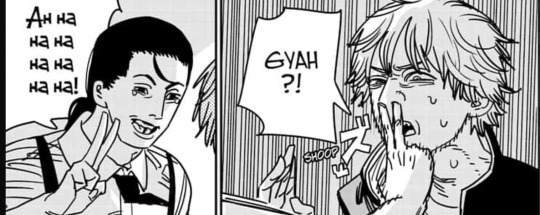
Asa and Yoru, Nayuta and Denji, two Chainsaw Man, two camps of worshippers versus detractors, two protagonists, a second part, the two identities of Denji, a high-school student and a hero himself, both demon and human: Chainsaw - Man.
But before we balance all that, let's take a closer look at this chapter.

First of all, I'd like to say how rich chapter 140 is. I see a lot of people criticizing Fujimoto's writing as someone who simply sets up absurd situations when absolutely nothing is left to chance. We're reading a manga by a film buff, so get your head around Chekov's rifle.
I'd like to remind you that Chainsaw Man is set in Japanese society.
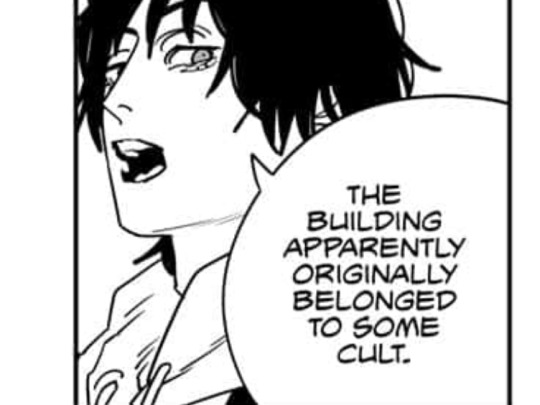
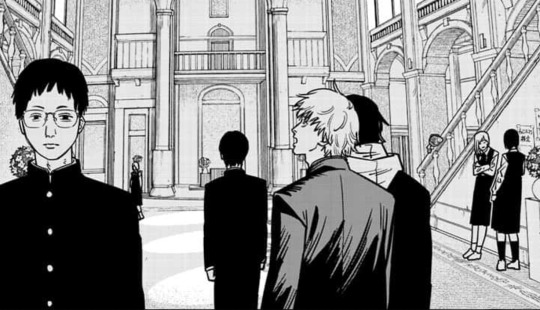
Ejecting a sect from a building, or even belonging to a cult that has nothing to do with a dominant, ancestral religion, is more common than in the West.
I've seen plenty of people wondering who could be at the head of the church for making people believe such a stupid story as a violet-ray weapon that would make adults stupid.
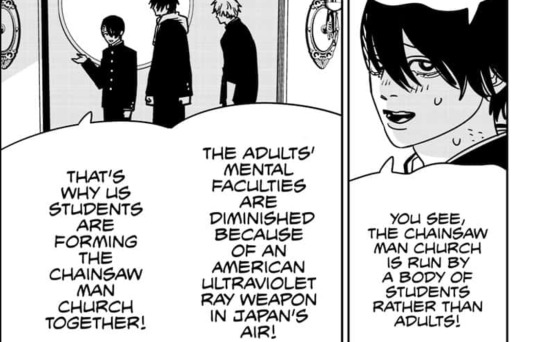
When it's the other way around, the church is exploiting the fact that high-school students are just thinking too much. And if there's one thing that saves Denji, it's that he thinks less.
Let's put things in context: this is the '90s, and even if the idea of nuclear weapons has been erased by Pochita, meaning that the Cold War has surely taken a different form in Chainsaw Man, Fujimoto has never denied geopolitical tensions.
Whether it's the mention of the USSR with Reze, Makima's instrumentalization of Japan, the history of weapons, the fact that the American government sought to eliminate Makima or that countries share the remains of the weapon demon...
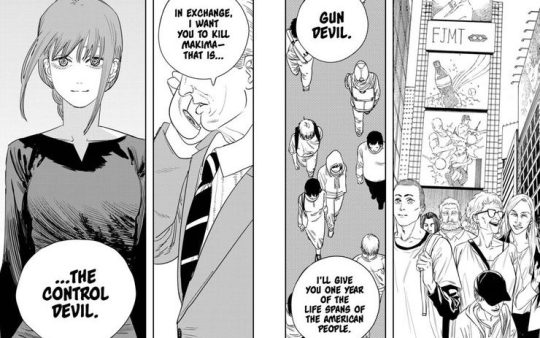
Countries are in tension. The church exploits this atmosphere of anxiety among teenagers who are beginning to form opinions that dissent from their parents.
Adolescence means coming into conflict with your parents' ideas, so come up with a story about how a gun makes them stupid. It's simply targeted manipulation that exploits the vulnerabilities of individuals in the midst of an identity crisis.
Becoming a teenager also means freeing oneself from a certain carefree attitude and better understanding of the world around us, hence the mention of Americans on the same level as adults.


I'd like to point out that this is not just a collection of absurdities. But for that, a bit of history... I hope I'm not teaching anyone that Japanese society has been turned upside down by the United States.
Without going into too much detail, during the 19th century, Japan went through the Meiji era. The Meiji government pursued a policy of modernization with the ultimate aim of bringing Japan up to the level of the Western powers.
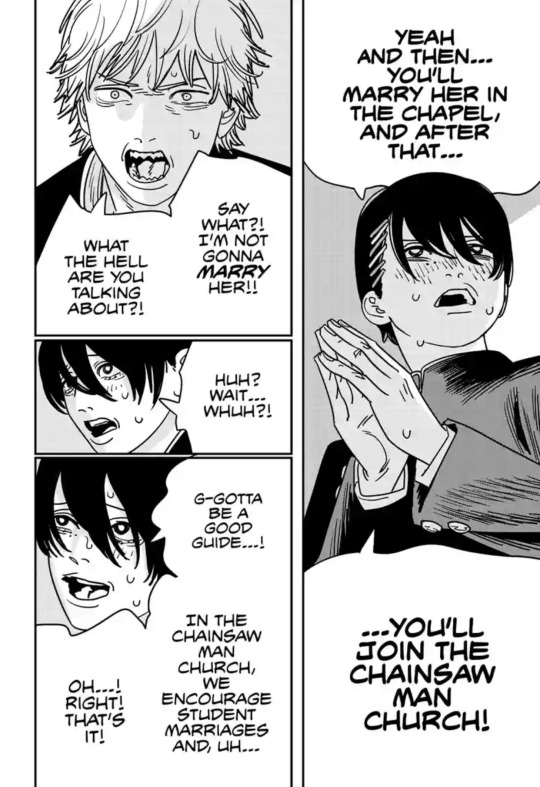
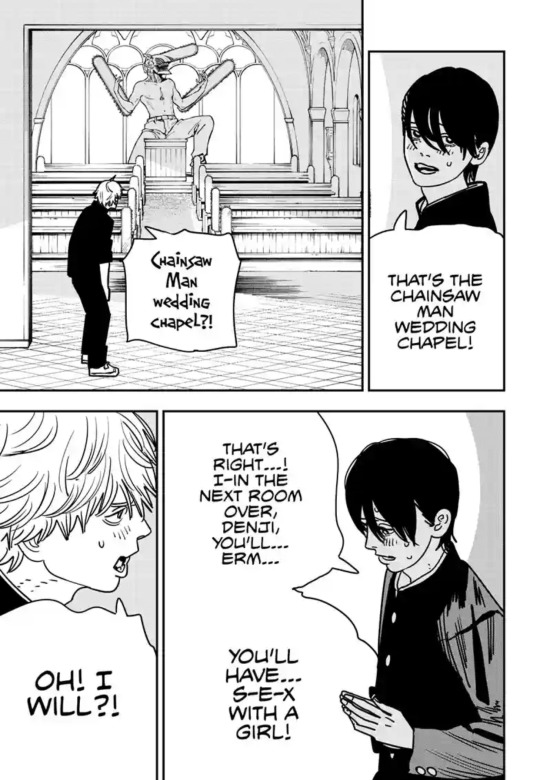
To compete with Western powers such as the United States, the government relied on centralized power to control citizens as much as possible... and this involved reforming the matrimonial system. With the popularization of "love marriage", the Meiji government changed tactics: the polygamous system was replaced by exclusive "love marriage".
The church used the same method of control as the Meiji government: reforming the matrimonial system by overturning institutions. From now on, it's no longer sex after marriage, but before it.

It's this kind of talk that just digs into the cracks that allows them to be brainwashed. But talk has never worked with Denji, who thinks concretely with what he can grasp. A date with a pretty girl, steak, sex, feeling the buttocks when he does the chair. What one would point to as perversity is what saves Denji. He thinks through his senses, his literal needs, not the abstract.
We can't say that Miri, who thinks he's free when he's being instrumentalized, repeating that it's the Americans' fault again, or asking Chainsaw Man if he's sure he hasn't picked up any ultraviolet weapons... that he’s stupid. Because weapons have lost their memory, they have no loved ones, no stories to refer to.
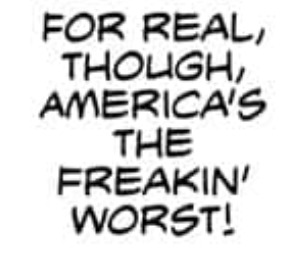


Miri convinces himself he's free, filling the void of his own forgotten history with false stories. The lack of education, of pillars, of history is what had tortured Denji, who was so easily manipulated. I'd go so far as to say that Reze is the most striking example of this.
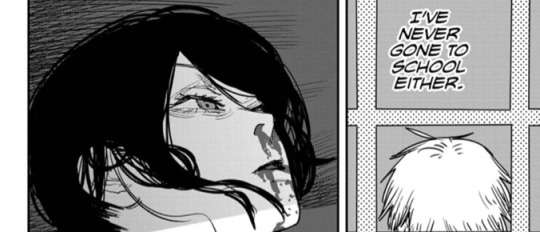
It's impossible to determine Barem's psychology, but he still demonstrates a third reaction to manipulation: while Denji evolves, Miri locks himself in denial : Barem manipulates in return. Revenge, reproductive mechanism, any number of reasons could explain why Barem exploits one of Denji's weaknesses: Asa.
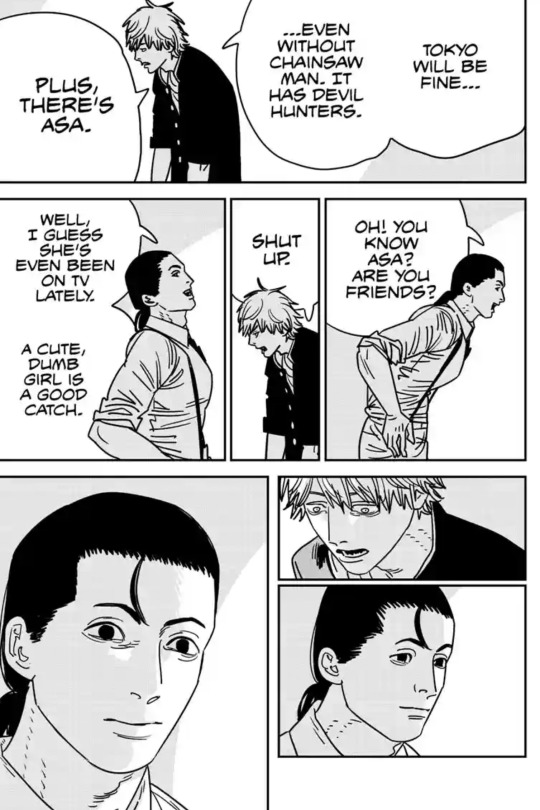
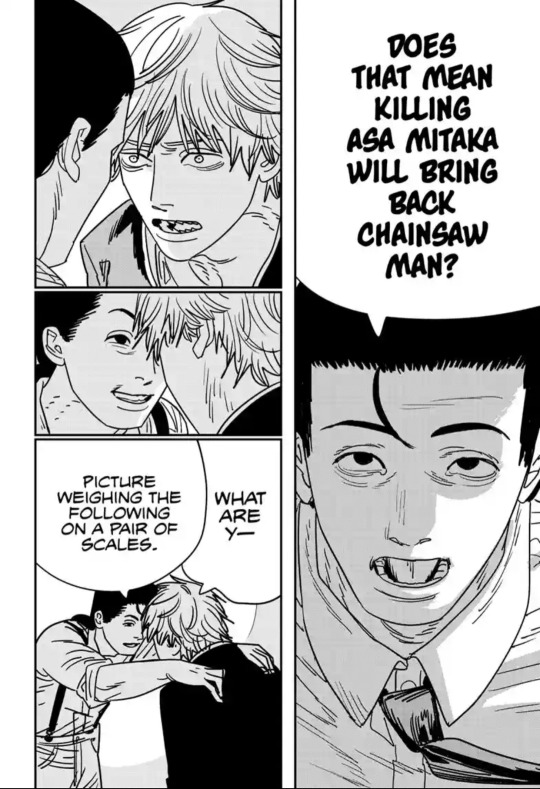
Now you're thinking, yes, that's all very well, you talk a lot... but what's that got to do with the number two?
The scale is the very image of dichotomy, of a relationship between two forces, two weights, two entities. And what does it have to do with manipulation? Several things.

First of all, manipulation also means taking on ideas that are not our own. It means no longer questioning them, confronting them with dissident ideas that would contradict them, or balancing them.
To balance is also to confront two options in a dilemma. Something that's come up several times, first initiated by Yoshida, then taken up in his own way by Barem: embrace his identity as Chainsaw Man or continue his normal life as Denji?
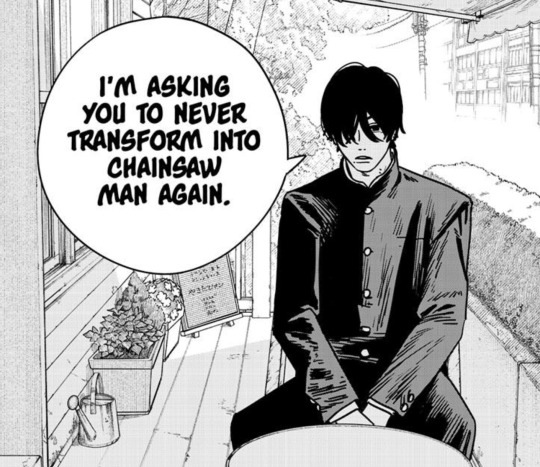
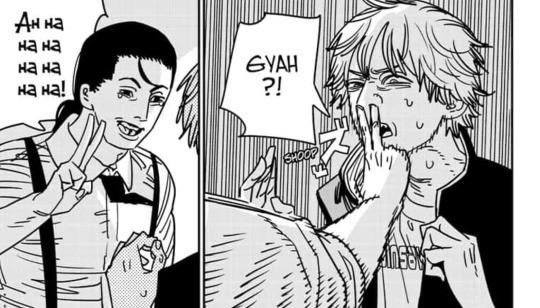
The manipulation since the start of Part 2 has been to split up Chainsaw Man. To have separated what constitutes his essence: human and demonic. To have split his nature, which has always been that of two beings in one.
And what if I told you that the answer lies in chapter 2 (yes, man). Here, Makima clearly explains to Denji that Pochita is not dead but continues to live with him, that he has two smells.
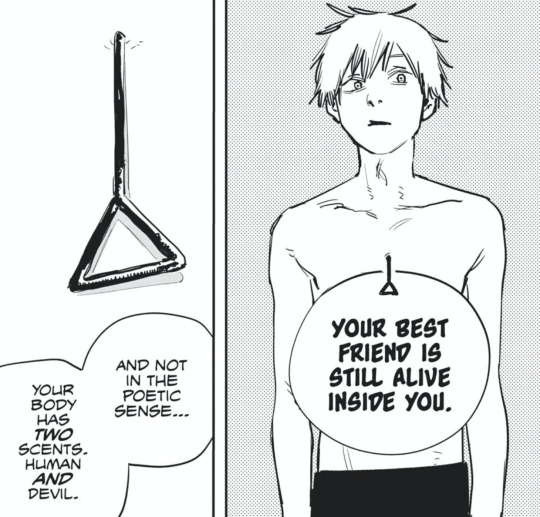

Fami's project is openly to separate Chainsaw Man, to cut its essence in two: the reunion of two beings.
That's why this chapter talks about marriage, which refers to the reunion of two individuals.
Barem would have us believe that these two choices are antinomic, that they are contradictory and cannot be fulfilled together. Only Denji can have both choices, he had already answered that. His sign of strength is two fingers. Two is Denji's strength. Becoming two is what literally allowed him to be reborn.
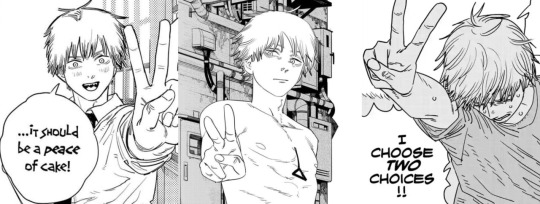
Of course, Denji doesn't want to marry; he's already one with one being through a contract: Pochita.
Pochita had merged with him so that he could live a normal life. It was never a normal life, but the life Denji wanted to live. Chainsaw Man is literally the means, a better life, the end.
The secret to surviving the manipulation then lies literally in Denji's heart.

#chainsaw man#csm#csm part 2#csm spoilers#csm 140#my thoughts#denji#yoru#asa#nayuta#makima#miri sugo#barem#reze
1K notes
·
View notes